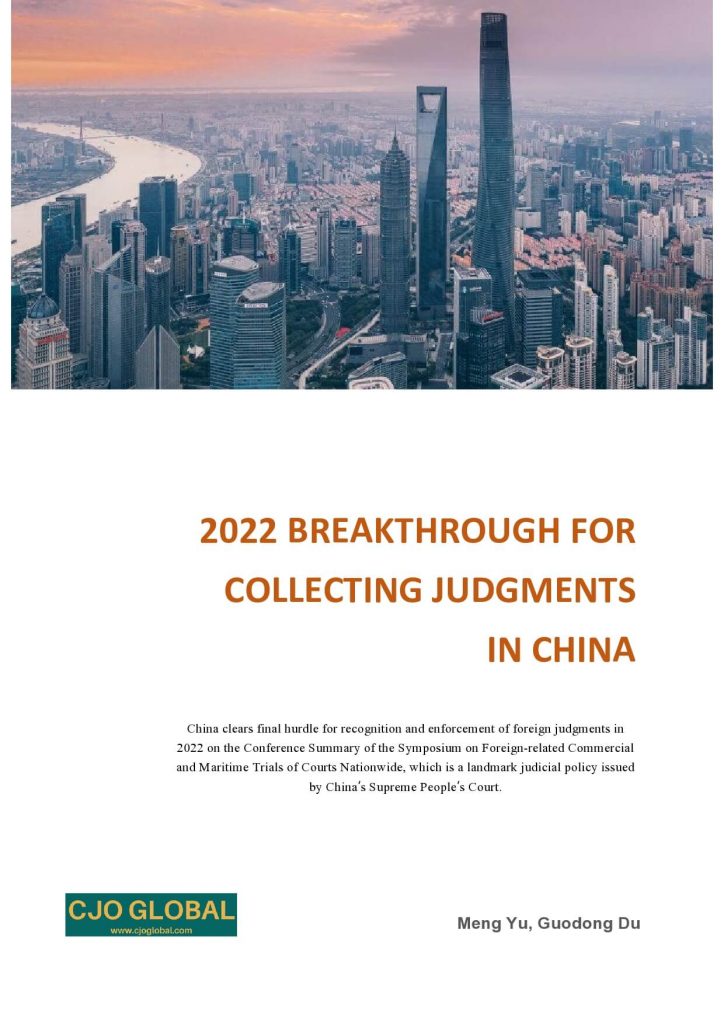China Issues Landmark Judicial Policy on Enforcement of Foreign Judgments – Breakthrough for Collecting Judgments in China Series (I)
Key takeaways:
- Despite that the elaboration of a judicial interpretation appeared to have been put on hold, China’s Supreme People’s Court has now resorted to conference summaries, which are not legally binding but have a practical impact, to express its views in recognition and enforcement of foreign judgments.
- The landmark 2021 Conference Summary addresses, among others, how Chinese courts would handle cases of applications for recognizing and enforcing foreign judgments, embarking on a new era for judgment collection in China.
- A total of 17 articles in the 2021 Conference Summary provide a detailed guideline for Chinese courts to review foreign judgment-related applications, including review criteria, refusal grounds, and ex ante internal approval mechanism.
Related Posts:
- China Issues Landmark Judicial Policy on Enforcement of Foreign Judgments – Breakthrough for Collecting Judgments in China Series (I)
- How Chinese Courts Review Applications for Enforcement of Foreign Judgments: Criteria and Scope of Application – Breakthrough for Collecting Judgments in China Series (II)
- How Chinese Courts Determine Reciprocity in Foreign Judgment Enforcement – Breakthrough for Collecting Judgments in China Series (III)
- How Chinese Courts Identify Foreign Judgments as Final and Conclusive? – Breakthrough for Collecting Judgments in China Series (IV)
- What Documents to Prepare for Enforcing Foreign Judgment in China – Breakthrough for Collecting Judgments in China Series (V)
- How to Write an Application for Enforcing Foreign Judgment in China – Breakthrough for Collecting Judgments in China Series (VI)
- Conditions for Enforcement of Foreign Judgments in China – Breakthrough for Collecting Judgments in China Series (VII)
- Where to File Application for Enforcing Foreign Judgments in China – Breakthrough for Collecting Judgments in China Series (VIII)
- Can Applicant Seek Interim Measures from Chinese Courts? – Breakthrough for Collecting Judgments in China Series (IX)
- Case Filing, Service of Process and Withdrawal of Application – Breakthrough for Collecting Judgments in China Series (X)
- How Chinese Courts Ensure Impartiality in Enforcing Foreign Judgments: Ex Ante Internal Approval and Ex Post Filing- Breakthrough for Collecting Judgments in China Series (XI)
China’s Supreme People’s Court (SPC) elaborated on how Chinese courts would handle cases involving the recognition and enforcement of foreign judgments in a conference summary issued in December 2021.
The judicial policy is the “Conference Summary of the Symposium on Foreign-related Commercial and Maritime Trials of Courts Nationwide” (hereinafter the “2021 Conference Summary”, 全国法院涉外商事海事审判工作座谈会会议纪要) issued by the China’s Supreme People’s Court (SPC) on 31 Dec. 2021.
As part of the ‘Breakthrough for Collecting Judgments in China Series’, this post introduces Article 39 of the 2021 Conference Summary, which the rules on whether and how applicants may seek interim measures (conservatory measures) in cases of the recognition and enforcement of foreign judgments in China.
I. What’s the conference summary?
This landmark conference summary is the “Conference Summary of the Symposium on Foreign-related Commercial and Maritime Trials of Courts Nationwide” (hereinafter the “2021 Conference Summary”, 全国法院涉外商事海事审判工作座谈会会议纪要) issued by the SPC on 31 Dec. 2021.
To start with, one needs to understand what is a ‘conference summary’ in China and its implication on adjudicative work for Chinese local courts.
As introduced in our earlier post, the Chinese courts issue conference summaries from time to time, which can serve as guidance to the judges in their trials. However, the conference summary is not a legally binding normative document as the judicial interpretation, but only represents the consensus among the majority of judges, which is similar to the prevailing opinion. For more information about the Conference Summary, please read “How China’s Court Conference Summary Affects the Trial?”.
According to the previous explanation of the Second Civil Division of the SPC on the nature of the 2019 Conference Summary of Civil and Commercial Trial of Courts Nationwide (全国法院民商事审判工作会议纪要), a conference summary is not a judicial interpretation, and therefore the court, on the one hand, cannot invoke it as the legal basis for judgment, but on the other hand, can make the reasoning on the application of law according to the conference summary in the “Court Opinion” part.
The 2021 Conference Summary is based on the symposium on foreign-related commercial and maritime trials of courts nationwide held by the SPC on 10 June 2021, and is prepared by the SPC after considering the opinions of all parties.
It represents the consensus of Chinese courts on cross-border commercial and maritime litigation in China, and covers 20 matters, among which, the recognition and enforcement of foreign judgments accounts for 15% of the total length. This shows that the recognition and enforcement of foreign judgments is one of the most important parts.
Previously, we learned that the SPC had attempted to draft a specific judicial interpretation on this matter. Should this come true, this judicial interpretation, which is legally binding for local courts, would provide a detailed guideline for courts to review applications for the recognition and enforcement of foreign judgments. However, this action appears to have been put on hold.
The SPC has now resorted to conference summaries, which are not legally binding but have a practical impact, to express its views in this field. It seems to have opted for a workaround.
The main points of the 2021 Conference Summary are as follows.
II. What does the Conference Summary say about the recognition and enforcement of foreign judgments?
The Conference Summary describes Chinese courts’ views on this issue in 17 articles, including:
2. Which Chinese court the applicant should apply to;
3. What application materials the applicant shall submit;
4. What the applicant’s application shall include;
5. How the court serves materials to the respondent;
6. How the court handles the respondent’s jurisdictional challenge;
7. How the applicant applies to the court for the preservation of property (interim measures)?
8. How the court handles applications that fail to meet the conditions for acceptance;
9. What kind of legal documents issued by foreign courts can be deemed as “foreign judgments” herein;
10. How a Chinese court determines whether a foreign judgment is valid;
11. What a Chinese court should do if it cannot confirm the authenticity and finality of a foreign judgment;
12. How a Chinese court should determine whether a reciprocal relationship exists between the country where the judgment is rendered and China;
13. How a Chinese court treat punitive damages in foreign judgments;
14. Under what circumstances a Chinese court may refuse to recognize and enforce a foreign judgment;
15. How a Chinese court should treat foreign judgments rendered in breach of arbitration agreements;
16. What a Chinese court shall do if the applicant withdraws the application; and
17. How a local court reports, in a hierarchical chain up to the SPC, a case of recognition and enforcement of a foreign judgment (also known as ‘ex ante internal approval mechanism’).
We will provide a more detailed discussion on these said points in the subsequent articles of the Series.
Do you need support in cross-border trade and debt collection? CJO Global's team can provide you with China-related cross-border trade risk management and debt collection services, including: (1) Trade Dispute Resolution (2) Debt Collection (3) Judgments and Awards Collection (4) Anti-Counterfeiting & IP Protection (5) Company Verification and Due Diligence (6) Trade Contract Drafting and Review If you need our services, or if you wish to share your story, you can contact our Client Manager: Susan Li (susan.li@yuanddu.com). If you want to know more about CJO Global, please click here. If you want to know more about CJO Global services, please click here. If you wish to read more CJO Global posts, please click here.

Photo by Brian Cyan on Unsplash









Pingback: How Chinese Courts Review Applications for Enforcement of Foreign Judgments - CJO GLOBAL
Pingback: How Chinese Courts Determine Reciprocity in Foreign Judgment Enforcement - CJO GLOBAL
Pingback: How Chinese Courts Identify Foreign Judgments as Final and Conclusive? - CJO GLOBAL
Pingback: What Documents to Prepare for Enforcing Foreign Judgment in China - CJO GLOBAL
Pingback: How to Write an Application for Enforcing Foreign Judgment in China - CJO GLOBAL
Pingback: China Clears Final Hurdle for Recognition and Enforcement of Foreign Judgments in 2022 - CJO GLOBAL
Pingback: Conditions for Enforcement of Foreign Judgments in China - CJO GLOBAL
Pingback: Where to File Application for Enforcing Foreign Judgments in China - CJO GLOBAL
Pingback: Can Applicant Seek Interim Measures from Chinese Courts? - CJO GLOBAL
Pingback: Where to File Application for Enforcing Foreign Judgments in China - Breakthrough for Collecting Judgments in China Series (VIII) - CJO GLOBAL
Pingback: Case Filing, Service of Process and Withdrawal of Application - CJO GLOBAL
Pingback: How Chinese Courts Ensure Impartiality in Enforcing Foreign Judgments - CJO GLOBAL
Pingback: China Introduces New Reciprocity Rules for Enforcing Foreign Judgments, What Does It Mean? - CJO GLOBAL
Pingback: China Dismisses Application for Enforcing New Zealand Judgment Due to Parallel Proceedings - CJO GLOBAL
Pingback: How to Know Whether My Judgment Can Be Enforced in China? - CJO GLOBAL